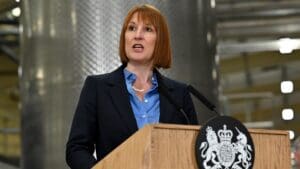Britain’s business community is bracing for a contracting economy as confidence tumbles to its lowest level in almost two years.
According to fresh analysis from consultancy BDO, sentiment has taken a sharp hit following Chancellor Rachel Reeves’s recent budget, stoking concerns among economists that the UK will end the year in decline.
BDO’s monthly optimism index fell by 5.8 points in November to 93.5, its weakest reading since January 2023 and the biggest single-month decline since August 2021. The consultancy’s separate tracker of economic output also dipped by 3.2 points to 94.7, slipping below the 95 threshold that signals contraction.
Paul Dales, chief UK economist at Capital Economics, warned that the economy’s meagre third-quarter growth of just 0.1 per cent, combined with eroding business sentiment, places Britain at clear risk of an economic contraction in the final quarter of 2024. “That would be a ‘milestone’ the government could do without,” he said.
The downbeat picture has been reinforced by new data from the Recruitment and Employment Confederation, which points to a steep fall in job vacancies and a rise in redundancies since Reeves’s budget on 30 October. Meanwhile, the prospect of resurgent inflation could complicate the Bank of England’s plans for further interest rate cuts. Analysts at Pantheon expect the consumer prices index to have risen from 2.3 per cent in October to around 2.6 per cent in November.
Sir Keir Starmer, the prime minister, sought to recalibrate public expectations by laying out six “milestones” for voters to judge his government’s performance. The move comes after Labour’s tricky start to its first term and in the wake of Reeves’s budget, which has stirred significant disquiet in the corporate sphere.
The chancellor’s £40 billion tax hike—of which £25 billion falls on employers’ national insurance contributions—has stoked fears of higher inflation, weaker wage growth, and a reluctance among businesses to hire. BDO’s hiring index edged down to 95.96 last month, reversing gains made in October and marking a return to uncertainty in the labour market. “Corporates appear to have become hesitant to expand staffing levels or replace departing employees,” said Ellie Henderson, economist at Investec.
At the same time, Reeves’s government has introduced the largest improvements to workers’ rights in a generation, alongside a 6.7 per cent rise in the minimum wage. Research by the accountancy network Moore UK shows these measures are broadly welcomed by owner-managed firms, with almost half endorsing the enhanced working conditions package.
Despite the longer-term danger that higher taxes could ultimately weigh on growth, the increased public spending they finance is set to lift economic output in the short term. The OECD predicts that the UK’s GDP will grow by 1.7 per cent in 2025, improving on its previous 1.2 per cent forecast.
Yet hopes of near-term interest rate cuts by the Bank of England remain overshadowed by rising business costs, including heftier national insurance bills. According to BDO, this leaves British businesses grappling with a “mixed picture” in the year ahead. The central bank aims to ease borrowing costs gradually—already lowered to 4.75 per cent from 5.25 per cent—but persistent cost pressures and signs of a business slowdown challenge the path forward.
A separate KPMG survey found that while cost pressures top the list of concerns for private business owners, there remains a wellspring of underlying resilience, with 92 per cent of respondents expressing some degree of confidence about the year to come.
A Treasury spokesman defended the government’s stance, saying the difficult budgetary choices were made to restore economic stability, support public services, and protect payslips from excessive tax. “We are now committed to delivering our plan for change,” said the spokesman, “focusing on economic growth, better public services, and meaningful improvements in living standards—measures that will ultimately benefit businesses and households alike.”
Read more:
UK economy set to contract as business confidence hits two-year low







